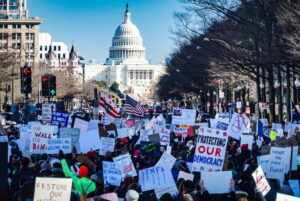Tag: capitol riots
Dark Storms Over the Capitol: Policing and Democracy After the Jan. 6 Insurrection
by The Cowl Editor on March 4, 2021
Campus

by Addison Wakelin ’22
Assistant News Editor
On March 2, the Board of Programmers and the Board of Multicultural Student Affairs hosted a panel of Providence College faculty to discuss the topic of the double standards in protest policing and the implications of the Jan. 6. attack on the U.S. Capitol Building. The faculty panel included Dr. Keith Morton of the public and community service and American studies departments; Dr. Jeff Johnson of the history and American studies departments, and Dr. Paul Herron of the political science department, all of whom gave diverse views on the events that occurred.
On Jan. 6, shortly before pro-Trump insurrectionists stormed the Capitol, Donald Trump spoke at the Stop the Steal rally, which his campaign helped organize. Projecting into an echo chamber of lies and conspiracies, Trump made various false claims about the presidential election being stolen, widespread voter fraud, and how he won by a landslide. Less than 30 minutes after Trump’s speech, the pro-Trump crowds had formed outside the Capitol, and the ensuing events occurred shortly after. Five people died in the aftermath, including U.S. Capitol Police officer Brian Sicknick.
The talk on March 2 gave important insight into the different political and social implications of the Jan. 6 insurrection. Morton most notably detailed the stark contrast of policing during the Jan. 6 Capitol insurrection and the Black Lives Matter protests this past summer.
The events that unfolded on Jan. 6 represent the deeply rooted institutionalized issues surrounding policing and race in the United States. The protests this past summer over the unjust murders of Breonna Taylor and George Floyd reflect larger issues of selective policing and deeply rooted racial inequality in this country.
“Our history of racialized violence by police influences all of the decisions and actions made in both the marches and in the insurrections and the ways in which we’re trying to interpret what those events mean,” stated Morton, reflecting on the distinct contrast of policing between the two events.
It has been close to two months since the assault on the Capitol took place. Of the thousands of participants in the attack, only 52 people were arrested on Jan. 6 in Washington, D.C., according to law enforcement officials. As of March 2, only 266 rioters have been formally charged.
In contrast, at the peak of the BLM protests this past summer, 427 protestors were arrested between May 30 and June 2, 2020, according to the metropolitan police department. The differences in police presence during the BLM protests over the summer versus the attack on Jan. 6 perpetuate those exact racial prejudices and issues with policing.
Johnson also provided insight into the ways in which history tends to repeat itself in American politics. Johnson described how much of the Jan. 6 attack mirrors past historical events, particularly the rhetoric surrounding the Burning of Washington on Aug. 24, 1814 and the controversial 2000 U.S. presidential election.
Herron, who specializes in American political history and constitutional law, raised important questions about the role of American political institutions in confronting such assaults on democracy. One of the most important questions Herron posed was about the role of Congress and the vice president in counting electoral votes, especially in their participation in aiding in the peaceful transfer of power.
The participation of several members of Congress, including Texas Sen. Ted Cruz, Missouri Sen. Josh Hawley, and Georgia congresswoman Marjorie Taylor Greene, who all rejected the electoral college votes of key swing states and have been accused of inciting the attack, has led to calls for their resignations.
The three faculty members reflected on the importance of remembering such events as Jan. 6, especially in the magnitude of precedence for the future state of politics in the United States. The insurrectionist attempt has proven the necessity for U.S. democratic institutions to be protected, and that the restoration of democracy is essential for the future of both American politics and civil society.
